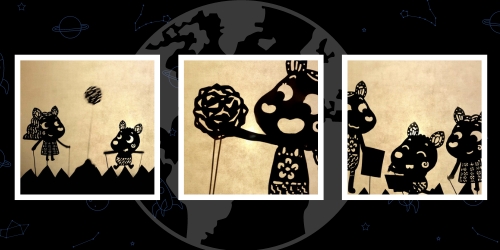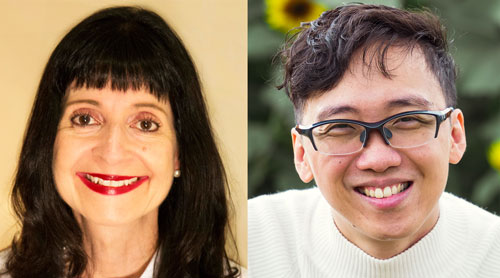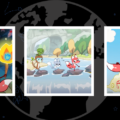This month, audiences can screen Desa Timun on the Planet Classroom Network. This film is curated for the Planet Classroom Network by KIDS FIRST! Film Festival.
Desa Timun (The Cucumber Village) is a heartwarming short film that combines traditional shadow puppetry with modern animation techniques to create a unique and delightful viewing experience.
Directed, produced, and written by Daud Nugraha, the film tells the story of three siblings in Cucumber Village and their journey to cheer up their youngest brother. With a message about the importance of creativity and family, it’s a story that will capture the hearts of audiences of all ages. Daud Nugraha is an Indonesian filmmaker, illustrator, and storyteller with a passion for combining traditional and modern art forms. Born in Yogyakarta, Indonesia, Daud has been fascinated by the art of shadow puppets since he was a child. Desa Timun marks his directorial debut in a children’s short film, blending the traditional art of shadow puppetry with modern storytelling and digital animation.
The Global Search for Education is pleased to welcome Daud Nugraha.
Daud, what inspired you to use the traditional art of shadow puppetry in your animation?
I have loved shadow puppets since I was a kid. I was born in Yogyakarta, Indonesia, and the culture of Indonesian shadow puppetry (wayang kulit) is popular among kids and adults. During my college years at the Bandung Institute of Technology, I was taught to incorporate local culture into my artwork because it gives us strength, uniqueness, and identity as Indonesian creators. So when I made my own animated short film, I went back to wayang kulit, which was a part of my childhood and myself as an Indonesian. I took it as a form of traditional animation.
However, I was also heavily influenced by digital animation, which I have loved watching since I was a child. But my biggest inspiration is Peppa Pig, a flat 2D cartoon that shares many similarities with how wayang kulit works in terms of limited view and movement. My vision was to create something like Peppa Pig with Indonesian wayang kulit, blending the traditional art of shadow puppetry with the storytelling of modern animation/cartoon.
How did you come up with the concept for Desa Timun (The Cucumber Village)?
There is a fable character that is very well known in Indonesia and Southeast Asia, called Kancil (mouse deer). It tells the story of a bright and clever animal, even though it’s very small and weak. The character has inspired many creators from Indonesia and neighboring countries to make their own versions of this Kancil character. So, I wanted to offer a different take for my version.
I was inspired by the kids I taught when I worked as a kindergarten teacher in 2014. The names of the children were Cila and Cili (not related). I had an idea to create different Kancil characters: Cila, Cili, and Cilo, based on their personalities. The title Desa Timun (The Cucumber Village) was also inspired by the fables. Kancil were said to love cucumbers, thus the name, The Cucumber Village. My dream is to add more characters to this village, so it will eventually grow and be filled with many villagers, like Richard Scarry’s Busytown. But I started small with just three characters at first.
What was the biggest challenge you faced in creating this film?
I made this short film with a very small team. My wife helped with hand-carving the paper to make the puppets. She and my two kids (9 and 5 years old) also helped me to be the puppeteers. We did the shooting in the attic of our small apartment while we were still living in Shanghai, China during the pandemic. The hardest thing was to direct my two kids to animate the shadow puppets because they were still very young. We had to do a lot of retakes, but it was such a fun experience working with my family and being able to create a new animated film together.
The film delivers a powerful message about creativity and the importance of family. Was that something you set out to achieve from the beginning or did it evolve naturally as you developed the story?
Having a background as a kindergarten teacher, encouraging kids to be creative has always been a part of my nature. Family is also very important to me because they are our best support system. Therefore, having a message about creativity and family has always been my intention when making this film. My life’s purpose is to bring happiness to kids all around the world. So, I want to make films that not only make kids laugh but also inspire them to create and spend time with their families. Because ultimately, what can be greater than the joy of creating something and having families who love you?
Thank you Daud!
C.M. Rubin with Daud Nugraha
Don’t miss Desa Timun, now streaming on the Planet Classroom Network. This film is curated for the Planet Classroom Network by KIDS FIRST! Film Festival.







Recent Comments